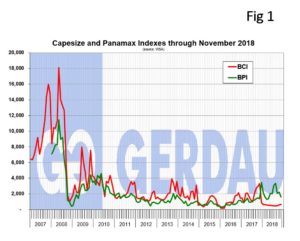The Baltic Dry Index
The Baltic Dry Index (BDI), for December tumbled 353 points to 1,192 month on month (m/m), a 22.8% decline. Changes on a m/m comparison can be exhibit wild swings as was the case in November. When looked at on a three month moving average, (3MMA) comparison the BDI fell 11.0% m/m to 1,395. On a 3MMA year on year basis, (y/y), the BDI was down 2.7%. The BDI has averaged 1,365 over the past 12 months, ranging from a low of 1,125 in February and April to a high of 1,710 in August.
The BDI is a shipping and trade index created by the London-based Baltic Exchange that measures changes in the cost to transport raw materials. The Baltic Dry Index offers a forward view into global supply and demand trends. A rising index can indicate a strengthening global economy. A contracting BDI index signals a slow-down.
The BDI includes three component ships: Capesizes, Panamaxes and Supramaxes. Capesize ships are the largest at >100,000 dead weight tons, (DWT). Capesize vessels make up 10% of the world fleet but account for 62% of dry bulk traffic. Panamaxes account for the vast majority of steel and its raw material freight, they weight in the range of between 60,000 to 80,000 DWT. Panamaxes account for 19% the world fleet and 20% of dry bulk traffic. Supramaxes (35,000 to 59,000 DWT), make-up 37% of the world fleet and combined with the smallest Handyman vessels (15,000 to 35,000 DWT), which account for 34% of the world fleet tally the remaining 18% of dry bulk traffic. Handymaxs are not counted in the BDI index.
 Figure 1 shows the 3MMA for both Capsize and Panamax indexes. These volatile indexes had both been trending higher on a YoY change since early 2016 until this month, as it is down 2.7%YoY. The Capsize (BCI), 3MMA increased by 10.8% to 656. It fell sharply on a y/y metric, falling 80.6%.
Figure 1 shows the 3MMA for both Capsize and Panamax indexes. These volatile indexes had both been trending higher on a YoY change since early 2016 until this month, as it is down 2.7%YoY. The Capsize (BCI), 3MMA increased by 10.8% to 656. It fell sharply on a y/y metric, falling 80.6%.
The Panamax (BPI), 3MMA on the other hand decreased by 22.6% m/m and was up 37.9% y/y. Demand for the medium sized Panamax vessels is currently outpacing demand for the larger Capesize vessels which are commonly employed to ship iron ore and coal.
The tariffs on steel and aluminum by the Trump administration is apparently influencing the BCI. Tariffs could slow global trade which would mean less ocean going freight and falling BDI prices.
At Gerdau we regularly monitor the Baltic Dry index since it is a leading indicator of demand for goods on a global scale. An increasing BDI signals stronger global trade which can be good for domestic business if the transactions are fairly traded.

